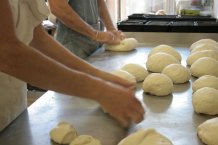
Bread making. Image courtesy of Emma's Bread
Archaeologists give school children a taste of ancient bread making
Archaeologists from the University of Exeter will be taking the art of Roman bread-baking into two Devon schools next week as part of a community initiative to engage young people in their local ancient heritage.
The researchers from the University’s Ipplepen Archaeological Project will be sharing some of the discoveries about ancient grains and farming systems used 2,000 years ago made during their excavations, with pupils at Sands School in Ashburton and Ipplepen Primary School near Newton Abbot.
The workshops are being organised by archaeologist Danielle Wootton, the Devon Finds Liaison Officer who is based at the University of Exeter’s Archaeology Department. With local bread maker Emma Parkin of Emma’s Bread in Exeter, and to coincide with national Real Bread Week, youngsters at Sands School will reproduce a loaf discovered in a baker’s oven at Pompeii using flour from grains of wheat and barley similar to the ancient grains discovered at the Ipplepen site.
With artist Joe Webster, Sands School students will also look at how food is represented in Roman mosaics and frescoes. Children will also be looking at stamp imprints on ancient bread, and making their own designs to see how a good impression in the bread might best be replicated and survive the baking process.
With Danielle Wootton, the Sands School students will then share the samples of bread and what they have learnt during a workshop on Roman food with children at Ipplepen Primary School. The children will be able to examine real Roman artefacts from the University’s collection and learn about what food was grown, prepared and eaten by people living in Ipplepen during Roman times. Mr Webster will then lead an art class where primary school pupils will paint scenes from ‘Roman Ipplepen’, which will go on display at the Hub Methodist Church in the village from 6 to 30 June.
Professor Stephen Rippon, Academic Lead for the Ipplepen Project said: “This is a unique opportunity for youngsters to find out about how people in Devon were living 2,000 years ago and to take part in a practical experimental archaeology workshop.”
Danielle Wootton said: “Our aim is to find new, interesting and fun ways of actively engaging with the local community in order to disseminate our research. It is great to team up with Baker Emma Parkin. We are trying different flours and ancient techniques and we are looking forward to seeing how the Roman bread turns out.”
Both schools are situated relatively locally to Ipplepen, a multi-period archaeological site whose use extended from late prehistory through to the early medieval period. In 2010 the University of Exeter embarked upon a programme of survey and excavation at the location in collaboration with the Portable Antiquities Scheme, British Museum and Devon County Council.
This season’s excavations run from June 6 to July 1 and there are 20 free places for local residents to participate. There will also be a public open day on Saturday June 25. Throughout the excavation there will be an information point at Ipplepen Methodist Church, where visitors can drop in to find out updates.
Date: 20 May 2016
